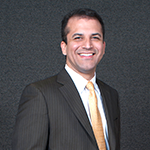Just a few years ago, many experts said the oil industry had peaked. Today, companies like Continental Resources are pioneering an oil renaissance with a new technology known as horizontal drilling. Continental has 1.2 million acres of North Dakota’s Bakken land leased for the right to drill, and the oil play helped the company triple its production from 2009 to 2012. Continental executives like Ray Gonzales, vice president of human resources, believe they can again triple production by 2017. Gonzales, who has spent his entire career as an HR generalist in the energy industry, says his passion remains driven by the innovations and job growth he has always seen in oil.
“I was born in New Mexico and raised in a single-parent family by a mother who only had an elementary education. She was smart, though, and a hard worker. She cleaned rooms and ironed clothes to make money for our family, so I’ve always appreciated hard work.
I did well in school and wanted to attend college, but I knew we didn’t have the resources. So, at the age of 17, I joined the army to take advantage of the GI bill. I found myself working in a personnel management position where I managed officer evaluations. The work was fascinating to me, because I was discovering what led to certain officers being promoted while others were passed over. I knew then that I wanted to go into HR, so I left the Army after three years and got my degree.
Quick Hits
with
ray gonzales
What are three websites you can’t go a day without checking?
Yahoo Finance Industry Center, for consolidated news that impacts the energy industry; USCCB.Org, the Catholic Bishops website, for daily readings; and SportsIllustrated.com, for my daily sports fix.
If you could travel in time to your college-age self, what college class would you tell yourself to drop? What would you replace it with?
I would drop an HR operations course that dealt with time and motion studies, as it was never useful in my career. I would replace it with a social science course that focused on group behavior as a deeper understanding of what drives behavior in a group setting, which is important in HR.
What has been one key piece of advice you’ve been given that you always draw upon?
Get out of your comfort zone and never stop learning and growing.
Professionally, I’ve spent time at Conoco, Kerr-McGee, Seahawk Drilling, Madagascar Oil, and Arizona Public Services, so I have more than 30 years in the energy industry. I’ve been at Continental Resources since 2011. It’s an exciting time to be working here because, although experts thought oil peaked just a few years ago, we are unlocking a vast new oil supply that can reduce imports and lead to a true resurgence in the industry. For HR, this means job creation, but for America, this has an impact on our balance of trade and national security.
We’ve made huge strides in a technology called horizontal drilling, and the advancement has dropped foreign oil imports 26 percent since 2008. By 2017, America will become the world’s largest oil producer, surpassing Saudi Arabia due largely to oil coming from North Dakota. We are out to change the world. We’re able to drill down for two miles, turn right for two miles, and hit a target the size of a lapel pin. We’re hitting oil and gas that we’ve always known was there, but has been unrecoverable until now.
This is a great achievement. Although it brings HR many opportunities, it brings many challenges. We’re moving fast, but we need to grow the right way. When I came in two years ago, we had 500 employees. Now we have 900. I’ve been busy building the infrastructure to support that. My HR team has had to rebuild fundamental areas like compensation structures and bonus plans, but my main areas have been recruiting and training and development programs. That’s because the oil industry is coming out of a tough period, and during that down cycle many young people stopped pursuing jobs in energy. On one side, our industry has 30-year veterans. On the other side, we have kids fresh out of college. There’s a huge gap in the middle. We’re addressing the issue by focusing on the development of 10-year employees and giving them resources and responsibilities sooner. This industry is part of our future, and STEM fields [science, technology, engineering, and mathematics] are increasingly important. A petroleum engineer in our company can start today at $95,000, while an accountant may start at $40,000.
As we grow, I think it is important also to preserve the DNA of Continental Resources. We are an innovative company with a unique spirit and the willingness to try new things. We preach those cultures and values to our employees. Rather than just let the company evolve, we need to capture and define what’s led to success. We’re actively assessing employees against this ideal value set to develop the qualities we’ll seek in future leaders. We’re creating a set of leadership competencies, a baseline that will allow us to be successful. Based on any gaps we find, we’ll train and develop people or put them in jobs that will help them develop the skills we need.
I care deeply about this business because I think it’s important to our economy and our nation. That’s what I’d advise younger HR pros to do—find something you care about, ask a lot of questions, and become an expert in your industry. Everything you do in HR is in service to the company so it can deliver outstanding business results.

